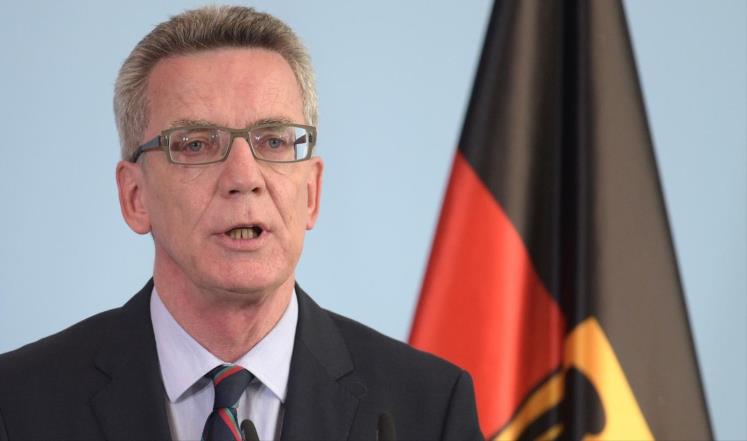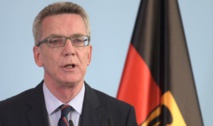"We have also done a lot to make sure it doesn't come to that ... The year 2015 can not, should not and will not be repeated," he said in an interview conducted earlier in the week in Berlin.
Referring to the rise in migrants crossing the Mediterranean in rickety boats to Italy, the minister said there should no longer be a policy of waving people through.
De Maiziere said that he believed the deal reached between the European Union and Turkey to block the route refugees had previously taken from Turkey into the EU via the Greek islands was holding.
Chancellor Angela Merkel's main rival for the chancellorship in next month's elections, Social Democrat Martin Schulz, recently warned of a fresh wave of asylum seekers given the rise in arrivals in Italy.
De Maiziere dismissed fears that these refugees would head north for Germany.
"Firstly, we are better prepared; secondly Italy is behaving differently this time; and thirdly, the numbers of refugees in Italy is not as high as the sweeping claims that are made about it," the minister told dpa.
He pointed out that the numbers of refugees arriving in Italy had dropped dramatically in July and August.
"We have also told Italy very clearly that there can be no more policy of waving people through. Italy is behaving accordingly," he said.
Given the ongoing tensions between Turkey and several EU countries, most notably Germany, de Maiziere said that there was no risk of the EU-Turkey refugee deal collapsing.
"Turkey has its own interest in the deal with the EU. It is in force and I have no doubt at present that everyone will continue to stick with it."
But he also stressed, "We can not be blackmailed."
De Maiziere did admit that the ongoing tensions had impacted negatively on security cooperation between Turkey and Germany.
"Cooperation with the Turkish security authorities is significantly worse than before," de Maiziere said, adding that the two sides did not share the same definition of terrorism.
Germany did not automatically label Turkey's Kurdish opposition as terrorist, and could not accept cooperating with Ankara on fighting its membership, the minister said.
The two sides were still cooperating in the fight against Islamic State, however, and Turkey was still informing Berlin when Germans who had been fighting for Islamic State in Syria or Iraq returned via its territory.
Relations between Germany and Turkey have been steadily deteriorating after the Bundestag voted to designate the mass killing of Armenians at the hands of the Ottomans a genocide. Turkey is the Ottoman Empire's successor state and disputes the designation.
Berlin has also protested the detention of some of its citizens in Turkey, while Ankara has accused Germany of sheltering people it labels terrorists.
--------------------------------------------------------------------------------------------------------------------
Referring to the rise in migrants crossing the Mediterranean in rickety boats to Italy, the minister said there should no longer be a policy of waving people through.
De Maiziere said that he believed the deal reached between the European Union and Turkey to block the route refugees had previously taken from Turkey into the EU via the Greek islands was holding.
Chancellor Angela Merkel's main rival for the chancellorship in next month's elections, Social Democrat Martin Schulz, recently warned of a fresh wave of asylum seekers given the rise in arrivals in Italy.
De Maiziere dismissed fears that these refugees would head north for Germany.
"Firstly, we are better prepared; secondly Italy is behaving differently this time; and thirdly, the numbers of refugees in Italy is not as high as the sweeping claims that are made about it," the minister told dpa.
He pointed out that the numbers of refugees arriving in Italy had dropped dramatically in July and August.
"We have also told Italy very clearly that there can be no more policy of waving people through. Italy is behaving accordingly," he said.
Given the ongoing tensions between Turkey and several EU countries, most notably Germany, de Maiziere said that there was no risk of the EU-Turkey refugee deal collapsing.
"Turkey has its own interest in the deal with the EU. It is in force and I have no doubt at present that everyone will continue to stick with it."
But he also stressed, "We can not be blackmailed."
De Maiziere did admit that the ongoing tensions had impacted negatively on security cooperation between Turkey and Germany.
"Cooperation with the Turkish security authorities is significantly worse than before," de Maiziere said, adding that the two sides did not share the same definition of terrorism.
Germany did not automatically label Turkey's Kurdish opposition as terrorist, and could not accept cooperating with Ankara on fighting its membership, the minister said.
The two sides were still cooperating in the fight against Islamic State, however, and Turkey was still informing Berlin when Germans who had been fighting for Islamic State in Syria or Iraq returned via its territory.
Relations between Germany and Turkey have been steadily deteriorating after the Bundestag voted to designate the mass killing of Armenians at the hands of the Ottomans a genocide. Turkey is the Ottoman Empire's successor state and disputes the designation.
Berlin has also protested the detention of some of its citizens in Turkey, while Ankara has accused Germany of sheltering people it labels terrorists.
--------------------------------------------------------------------------------------------------------------------









 Home
Home Politics
Politics











